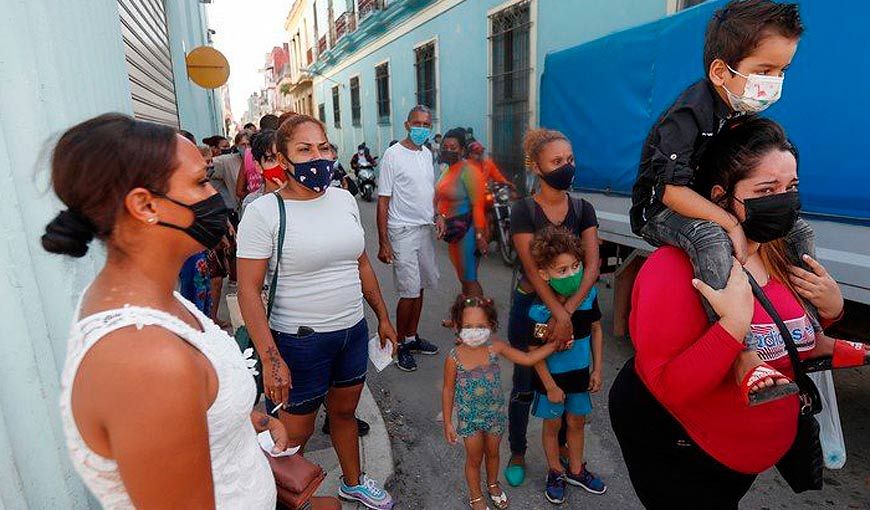The number of people arrested and sentenced for political motives grew in Cuba after the protests that took place on July 11, 2021 (11J). In November 2020, the Prisoners Defenders (PD) organization counted 137 political prisoners; its latest report published in early November 2021, recorded a total of 683 political prisoners.
Meanwhile, the Justicia 11J group and CUBALEX compiled a list of those arrested after 11J, in which they highlight the arrests of minors. They have documented the arrest of 45 minors (including those imprisoned for reasons linked to the call to protest on November 15, 2021 (15N); of whom 29 have been released, some with preventive measures of home arrest or on bail; nine of them remain behind bars.
Faced with this landscape, some Cuban citizens have asked themselves whether they would be able to push a citizen-led effort to release these political prisoners, who have fabricated crimes and excessive sentences hanging over their heads.
To get Cuban political prisoners released, some people have thought about the feasibility of launching an amnesty campaign. Others are against this idea and claim that amnesty would imply recognizing the a crime committed by the prisoner.
In addition to these discussions on the matter, Cuban leaders have never granted amnesty to anyone since they came into power in January 1959. They have preferred to use other mechanisms such as pardons in political negotiations or mass releases. A key incentive may have influenced the fact that not a single amnesty has been granted since the Revolution’s triumph. Amnesty implies acceptance of a political crisis and the need to yield in order to resolve it.
There are examples of campaigns in favor of releasing Cuban political prisoners – such as the one created by the San Isidro Movement “Where you fall, I rise”. However, in addition to initiatives such as this one, a legal recourse such as the popular legislative initiative can be used to push a draft bill to release prisoners from below, and with the support of different actors.
Popular legislative initiatives are instruments used in countries with citizens who are actively involved in national political life. In Cuba, such initiatives need to comply with a series of requirements and up until today, the National Assembly of People’s Power (ANPP) hasn’t even discussed a single draft bill put forwards by citizens.
Citizens’ intitiatives have been used in the past here as political tools; such as the case of the Varela Project, driven by Oswaldo Paya – founder of the Christian Liberation Movement. The Varela Project included the proposal for freedom of speech and association, amnesty for political prisoners and a new electoral law. The document requested that the legislature put every one of its proposals up for vote in a plebiscite.
On May 10, 2002, Oswaldo Paya handed in 11,020 signatures, which later went up to 35,000, to the offices of the National Assembly. However, the legislative body didn’t validate the project.
Instead, a month later (June 26, 2002), the Cuban Parliament unanimously voted to legitimize a constitutional amendment that declared the irrevocable nature of the socialist system in the country and the Communist Party’s role as the leading superior political force of the State and society.
In 2016, the animal rights advocate group Proteccion de Animales de la Ciudad (PAC) managed to collect 8,000 signatures for a draft animal protection act, which was never presented. Five years later (February 2021), the Cuban government announced the approval of a “Animal Wellbeing” law.
Requirements to promote a popular initiative in Cuba
The regulations are stipulated in Law 131/2019 of the “National Assembly and Council of State Organization and Functioning”. The key requirements it sets out are:
● Present a draft proposal with the support of at least 10,000 signatures.
● The 10,000 signatures need to be validated by a certificate issued by the electoral registry that proves the “voter” status of every signee.
● A document called “Grounds” must be presented, with the proposal, including economic, legal and social analyses to support it.
The fact that signees are obliged to be voters is a way to exclude Cuban citizens who no longer hold “legal residency” on Cuban soil. Current residency is a new concept that was introduced into Cuban Electoral Law, which was passed in August 2019 after the promulgation of the 2019 Constitution. The concept conditions and further limits Cubans living abroad from exercising their political rights. Due to the restrictions that stem from non-legal residency, it will be very hard for Cuban emigres to start or support popular legislative proposals – including one that might call for the release of political prisoners.
Citizens’ initiative promoters also need to present “results from meetings with bodies, organizations and other institutions that need to be consulted, corresponding with the matter”; although the law doesn’t explicitly explain how these results can be certified or to which institution or organization it must turn to do this.
In the case of promoting an initiative that aims to release political prisoners, red tape like the above could be sidestepped as the only body that has the power to issue this kind of regulation is the National Assembly of People’s Power. The same body that the request needs to be presented to.
After 15N, the main problem that led to Archipielago’s call for a protest remains intact: the existence of over 600 political prisoners. It’s very likely that the only mobilizable capital that survives after this date in Cuba, is the vigor of mothers and the relatives of these people who remain in jail. A capital that hasn’t been harnessed or channeled by any movement, including Archipielago.
This capital -built and upheld by the human ties that exceed any political consideration-, could be used to collect signatures in support for a draft bill that could serve as the coordination of a media and political campaign in favor of releasing Cuban political prisoners.
This vigor of the relatives of political prisoners may be accompanied by different actors in civil society. However, it shouldn’t be capitalized on by established political and social organizers. It should develop and be promoted by the interested parties, those who denied the company of their loved ones.
In autocratic environments, such as in Cuba, the decision to use tools like the PLI, shouldn’t be looked at from a legal analysis. Its assessment should be based on how it works as a political instrument to push agendas, issues and keep a dialogue with those in power.
In the case of political prisoners, not sustaining the tug-of-war with those in power will allow leaders to profit off a phenomenon they themselves have created. It would allow them to use Cubans in prison as a bargaining chip, like it did in the release and later exile of over 100 political prisoners between 2010 and 2011.
This article was translated into English from the original in Spanish.










comments
We moderate comments on this site. If you want to know more details, read our Privacy Policy
Your email address will not be published. Mandatory fields are marked with *